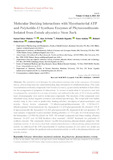Molecular Docking Interactions with Mycobacterial ATP and Polyketide-13 Synthase Enzymes of Phytoconstituents Isolated from Entada abyssinica Stem Bark
Date
2022-11-09Author
Obakiro, Samuel Baker
K'Owino, Isaac
Kigondu, Elizabeth
Andima, Moses
Owor, Richard Oriko
Kiprop, Ambrose
Metadata
Show full item recordAbstract
The search for novel therapies for tuberculosis continues due to the emergence of resistant
strains, adverse drug reactions, and potential drug-drug interactions of antitubercular drugs. This study
was undertaken to identify compounds from Entada abyssinica, a plant used by herbalists in East Africa
for the management of symptoms of tuberculosis. An extract of shade-dried E. abyssinica stem bark
was prepared by maceration in a mixture of acetone and methanol in the ratio of 3:2. Column and thin
layer chromatography were used to isolate pure compounds. The structures of the compounds were
elucidated using nuclear magnetic resonance and infrared spectroscopy. The compounds were further
studied using in silico tools to predict their binding affinities, descriptors of pharmacokinetics, and
toxicity. Seven known compounds: 2,3-dihydroxypropyltriacontanoate (1), 1',26'-bis-(2,3-
dihydroxypropyl) hexacosanedioate (2), stigmasterol 3-O--D-glucopyranoside (3), sitosterol 3-O--
D-glucopyranoside (4), Spinasterol 3-O--D-glucopyranoside (5), stigmasterol (6) and spinasterol (7)
were isolated. Compounds 1 and 2 had better binding affinities (-27.7374 and -28.5726 Kcal/mol) than
the bedaquiline (-22.9042 Kcal/mol) for ATP. All isolated compounds had better binding affinities
(between -21.4357 and -18.7809 Kcal/mol) than isoniazid (-10.8307 Kcal/mol) for polyketide-13
synthase enzymes. The compounds showed variable but promising pharmacokinetic properties with
minimum toxicity. E. abyssinica stem bark contains phytochemicals with promising antimycobacterial
activity via inhibition of the ATP and polyketide-13 synthase enzymes. In vitro and in vivo studies are
recommended to v
URI
https://doi.org/10.33263/BRIAC134.323https://biointerfaceresearch.com/wp-content/uploads/2022/09/BRIAC134.323.pdf
http://ir-library.mmust.ac.ke:8080/xmlui/handle/123456789/2496
Collections
- Gold Collection [1031]

